

MOOC Design and Development Guidelines 2 Feb 2013. MOOCs - Teaching & Learning - University of Tasmania, Australia. Massive Open Online Courses (MOOCs) Massive Open Online Courses (MOOCs) "offer a middle ground for teaching and learning between the highly organised and structured classroom environment and the chaotic open web of fragmented information".
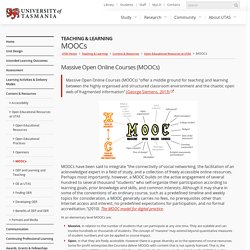
(George Siemens, 2013) MOOCs have been said to integrate "the connectivity of social networking, the facilitation of an acknowledged expert in a field of study, and a collection of freely accessible online resources. Perhaps most importantly, however, a MOOC builds on the active engagement of several hundred to several thousand "students" who self-organize their participation according to learning goals, prior knowledge and skills, and common interests.
Although it may share in some of the conventions of an ordinary course, such as a predefined timeline and weekly topics for consideration, a MOOC generally carries no fees, no prerequisites other than Internet access and interest, no predefined expectations for participation, and no formal accreditation. Schedule — Learning with MOOCs III. Session 1A: MOOCs for STEM Education. . .
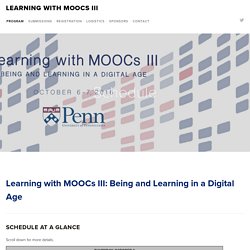
Includes the following papers:"Comparing the efficacy of face-to-face, MOOC, and hybrid computer science teacher professional development" by Carol Fletcher, W. Wesley Monroe and Kristin Anthony (University of Texas at Austin)"MOOCs as an equalizer? The gender gap in STEM" by Vinod Bakthavachalam and Emily Glassberg Sands (Coursera)"Factors related to post-MOOC development" by Elle Yuan Wang (Columbia University) and Ryan Baker (University of Pennsylvania) Session 1B: Problem-based Learning and Authentic Learning Environments. . .
Includes the following papers:“How do virtual teams collaborate in a PBL MOOC?” MOOC design workshop: educational innovation with empathy and intent. MOOC Design and Development Guidelines 2 Feb 2013. B-MOOC » 4 steps to Build MOOC. Depending on corporate objectives and value creation target, we assist our clients in building, for MOOC environments, the appropriate Course design, Course materials and Interface design.
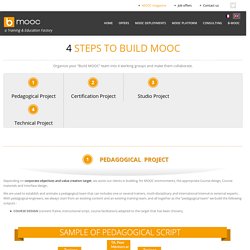
We are used to establish and animate a pedagogical team that can includes one or several trainers, mutli-disciplinary and international internal or external experts. With pedagogical engineers, we always start from an existing content and an existing training team, and all together as the “pedagogical team” we build the following outputs : COURSE DESIGN (content frame, instructional script, course facilitation) adapted to the target that has been chosen), MOOC Design and Development Guidelines 2 Feb 2013. Learning Pathways. B-MOOC » 4 steps to Build MOOC.
Reflections on Learning Design Process Models 1. Over the last month, Rebecca Galley, Paul Mundin and I have been reflecting on a range of our recent meetings and project related activities (including meeting with colleagues from Birmingham City and Gloucestershire, with our external partners, and OU colleagues).
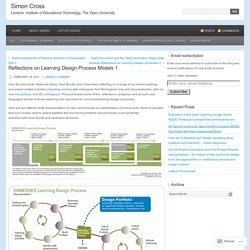
This post shares some of this ‘reflection-in-progress’ and as such uses languages familiar to those exploring new structures for curriculum/learning design processes. 5 MOOC Building Platforms. Now that MOOCs are hitting the scene, everyone wants to jump on board!
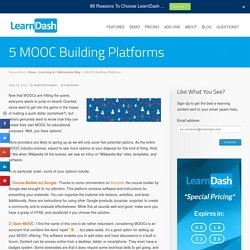
Granted, some want to get into the game in the hopes of making a quick dollar (somehow?) , but others genuinely want to know how they can create their own MOOC for educational purposes. Well, you have options! More providers are likely to spring up as we will only cover five potential options. What the research says about MOOCS and SPOOCs! The 12th What the Research Says was held at the London Knowledge Lab on Friday 29th November from 1:30-4:30.
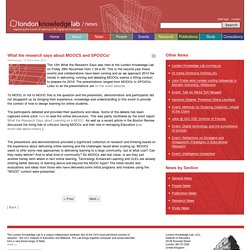
This is the second year these events and collaborations have been running and as we approach 2014 the trends in delivering, running and debating MOOCs seems a fitting context to prepare for 2014! The presentations ranged from MOOCs to SPOOCs. SPOCs may provide what MOOCs can’t. It’s hard to follow higher education news these days without seeing a reference to MOOCs.
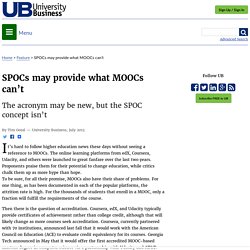
The online learning platforms from edX, Coursera, Udacity, and others were launched to great fanfare over the last two years. Proponents praise them for their potential to change education, while critics chalk them up as more hype than hope.To be sure, for all their promise, MOOCs also have their share of problems. For one thing, as has been documented in each of the popular platforms, the attrition rate is high. The Evolution of Online Learning and Related Tools and Techniques toward MOOCs: Educational IS&T Book Chapter. The latest development in the online learning environment, Massive Open Online Courses, dubbed ‘MOOC,' has garnered considerable attention both within and without the academy.
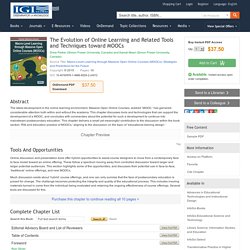
Open Education. The aim of this scoreboard is to highlight the huge potential that European institutions have in the world of OER and to help visualize this potential by compiling the existing European-provided MOOCs available on different open websites.
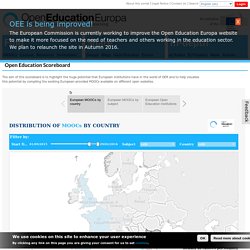
European MOOCs are those provided by European institutions, regardless of the platform that hosts them. Instructional Design. Tools & resources - Open Learning Design Studio: the MOOC. Oldsmooc. eL Guidelines 6Mar06. Emma European Moocs. WalkMe - The Enterprise Guidance and Engagement Platform. Tsw0701b. A complete list of Massive Open Online Courses (free online courses) offered by the best universities and entities. With SPOCs, HarvardX tries making MOOCs smaller. In May 2012, edX president Anant Agarwal introduced Harvard and MIT’s joint venture in massive open online courses (MOOCs)with a bold promise: “Online education will change the world.”
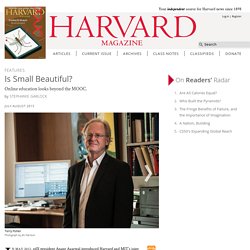
In the years since, the hype surrounding MOOCs has oscillated between outsized optimism and declarations of fast failure. There were early signals of hope: more than 180,000 students registered for CS50x, the MOOC version of Harvard’s popular introductory computer science course, after it launched in October 2012. The next month, The New York Times declared 2012 “The Year of the MOOC.” But there were reasons for concern as well. Less than 1 percent of those original CS50x registrants—1,439 students—completed enough of the course to earn a certificate. This quickly churning cycle of excitement and disappointment makes it difficult to evaluate the true promise of Harvard’s educational experiment. Beyond the “Guru on a Mountaintop” What are the top elearning portals? - Quora.
A University Guide to MOOCs. 5 MOOC Building Platforms.
How it works. The quick start guide to how to learn with FutureLearn. How you access your Activity, Replies and Progress has recently changed. We’ll be updating this video soon, but in the meantime, read our blog post for details. Pick a course Browse our course list to find something that you’d like to learn about. We have courses in a diverse range of subjects and are always adding more. Perhaps you might want to invite a friend to take part with you? Introduce yourself While you’re waiting for the course to start, you can fill in your profile page so that other learners can find out more about you. We’ll email you to let you know when the course starts. Start the course Once the course begins, a link will appear on Your courses dashboard.
MOOCs. Planning Making a MOOC can mean more or less hard work, depending on your level of ambition. A good place to start would be to think seriously about the target audience for your course. Who is the course aimed at? Kursplanlegging mal fl. Futurelearn academic and MOOC creator. Futurelearn educator stories represent contributors’ visions of the roles of educators within Futurelearn. Dr Angela Ashby is the academic responsible for creating her university’s first Futurelearn massive open online course (MOOC) – probably the closest that the MOOC comes to having a ‘teacher’.
However, she is working with a team of academics on content production, and learners are likely to see Professor Rob Williams (the face of the course) as their teacher. All Courses Have an OverviewWith. Designing and Running a MOOC.
EMMA. Home – Designers for Learning Studio. Amazon. MOOCs FutureLearn. 370743 1 En 6 Chapter Author.